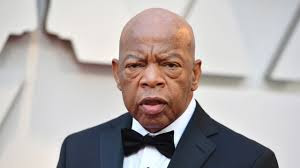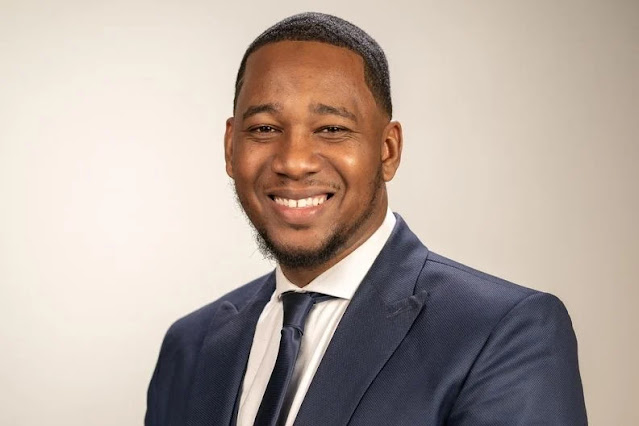U.S. House passes the John Lewis Voting Rights Advancement Act, proposed legislation that would restore a provision of the Civil Rights Act of 1965 that required federal oversight in voting venues across the country that have a history of discrimination....Remembering the late congressman and Civil Rights icon John Lewis....By editor Kathy Wray Coleman of Clevelandurbannews.com and Kathywraycolemanonlinenewsblog.com, Ohio's leader in Black and alternative digital news
 |
| Former United States president Barack Obama, the nation's first Black president, bestows the Presidential Medal of Freedom on the late Georgia Congressman John Lewis in 2011, Lewis also a Civil Rights icon who marched with the Rev. Dr. Martin Luther King Jr. Clevelandurbannews.com and Kathywraycolemanonlinenewsblog.comTel: (216) 659-0473. Email: editor@clevelandurbannews.com. |
As a federal lawmaker he fought against the reversal of decades of Civil Rights gains and spoke out against the Supreme Court's 2013 decision in Shelby County vs Holder, saying it lessened government over watch of state voting rules and made it easier for state officials to make it harder for Black and other racio- ethic minority voters to vote.
Led by House Speaker Nancy Pelosi, Congressional Democrats remain concerned about voting access to Blacks and other vulnerable groups as they continue to demand sweeping voter rights changes while Republican-dominated state legislatures across the country, including in Georgia in April, adopt voting laws that Democrats say severely limits voting for Black people.
The son of sharecroppers who was beaten and brutalized along with some 600 other protesters as a 25-year-old voting rights activist as they crossed the Edmond Pettus Bridge from Montgomery, Alabama to Selma, Georgia on Sun, March 7, 1965 to demand passage of the Voting Rights Act 1965, Lewis was one of the most respected members of Congress.
The celebrated bridge crossing, led by the late and iconic Civil Rights leader the Rev Dr. Martin Luther King Jr., and affiliated violence by police against protesters, would come to be known as "Bloody Sunday."
Lewis nearly died that day, history says. But instead he survived and went on to fight for Civil and Human rights for decades to come, and until cancer slowed him down.
A celebrated death that his colleagues in Congress, Civil Rights leaders and mourners nationwide called a a tremendous loss to the Black community and the fight for democracy and equal opportunity, Lewis died on July 17, 2020. As part of a procession held nine days after his death, a carriage carried his body across the Edmund Pettus Bridge, a symbolic measure that was a part of the week-long funeral activities for the Congressman, the first Black federal lawmaker to lie in state at the U.S. Capitol.
"It is with inconsolable grief and enduring sadness that we announce the passing of U.S. Rep. John Lewis," the Lewis family said in a statement after his death. "He was honored and respected as the conscience of the U.S. Congress and an icon of American history, but we knew him as a loving father and brother."
A former Georgia state legislator out of Atlanta who represented Georgia's 5th congressional district in Congress, Lewis was a native of Troy Alabama.
His great grandfather was born into slavery.
He lost his first bid for Congress and later won the seat in 1986 against his Republican challenger, but only after winning a contentious and now infamous Democratic primary over Julian Bond, a prominent Black Georgia state senator at the time.
One of 10 siblings, he was 16-years-old when he fought to desegregate public libraries in Troy and against Jim Crow Laws.
While in college in Nashville studying theology on a scholarship he was a member of the activist student group the Freedom Riders that fought against racial segregation and to desegregate lunch counters in the city and became a symbol of the student movement for racial equality.
The congressman once said that that his true activism was inspired by the Montgomery Bus Boycotts that took place when he was 18-years-old, and the sermons of Dr King on the radio.
He fought with King and the Southern Christian Leadership Conference that King led during the height of the Civil Rights Movement of the 1960s and spoke at the March on Washington in 1963 in spite of fears by then president John F. Kennedy that his speech might be too radical.
At 23-years-old he was the youngest speaker at the event in Washington, and gave a dynamic speech, pundits said, a speech overshadowed by Dr. King's historic "I Have a A Dream Speech."
He was arrested for civil disobedience more that 44 times, 40 of those arrests occurring before he was elected to Congress.
He returned to Selma each year for anniversary festivities and to remember "Bloody Sunday."
A recipient of the Presidential Medal of Freedom in 2011 from former president Barack Obama, the nation's first Black president, Lewis never stopped fighting for justice for the underprivileged and the disenfranchised.
He endorsed Obama for president in 2008 and for reelection in 2012, and he boycotted the inauguration of former president Donald Trump in 2016, whom President Joe Biden defeated last November in a contentious election. Lewis was also a strong ally Biden, a former U.S. senator turned vice president whom he served with in Congress.
One of his last public appearances was a town hall with Obama.
A husband and father, Lewis loved Black people, unequivocally.
He was married to his wife Lillian for nearly 50 years, and until her death in 2012.
Whether fighting for public policy changes for his constituents in particular, or for the country as a whole, overtime he drew the love and respect of his fellow lawmakers. He was a biblical figure on a mission, and in spite of his stubbornness at times he had friends and enemies across partisan lines.
Considered a hard- core liberal in Congress by some accounts, Lewis opposed the U.S waging of the 1991 Gulf War, and the Clinton Administration on NAFTA and welfare reform. During his 30-plus years in Congress representing a district in the seep South Lewis opposed the Iraq War and also fought in Congress for public policies in support of voting rights, reproductive rights for women, affirmative action, gun control, human and Civil Rights, universal healthcare and the gamete of issues embraced by the liberal wing of the Democratic Party. He backed same sex marriage, which became legal under federal law across all 50 states and the District of Columbia in 2015.
His legacy, however, transcends the Democratic Party that he had no problem challenging on matters he deemed necessary to address.The National Museum of African American History opened on the National Mall in Washington D.C. in 2016 during Obama's tenure, Lewis the impetus for the congressional bill that led to funding for the historical monument.
Obama praised the congressman when he was on his deathbed.











Comments